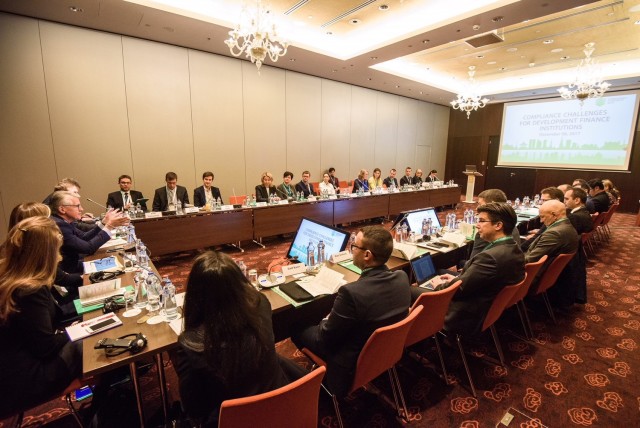Discussions on DFIs compliance risks at IIB’s Bratislava conference

One of the integral features of modern development financial institutions (DFIs) is the application in work of regulated and constantly updated compliance procedures.This allows DFIs to remain transparent to shareholders and effectively combat prohibited practices, such as fraud, corruption and conflicts of interest, anti-money laundering and combating the financing of terrorism (AML/CFT).
The issues of compliance risks related to the DFIs activities and ways for their decrease took center stage in Bratislava at a workshop-conference Compliance Challenges for Development Finance Institutions held by the International Investment Bank (IIB) on December 6.This is the first time the Bank has ever held such an event and it took place in conjunction with the business agenda of the 108th meeting of the IIB Council in Slovakia.
This unique educational seminar for the Central East European region was attended by over 30 anti-money laundering experts and representatives of compliance divisions of DFIs, national development banks, export credit agencies (ECAs), and leading commercial banking structures from IIB member states, as well as a number of third countries, including Austria, Belarus, and Kazakhstan.
The seminar was a logical continuation of the Bank's systemic activities on building an internal compliance control system, focused on cooperation in this area with other development institutions. An important milestone in the development of such cooperation was the acceptation by the IIB of the obligation to abide by the Unified Anti-Money Laundering and Countering Fraud and Corruption Rules (AML Rules) in 2015. The standards were developed by the IFI Anti-Corruption Task Force.
It was pointed out at the workshop that the implementation of a compliance control system consistent with international rules and standards within the IIB has been an important factor behind the Bank’s stability and has made it possible to protect its investments against negative risks.
The breakout session of the first seminar was devoted to a discussion of hot topics related to compliance at DFIs. Speakers from the European Bank for Reconstruction and Development (EBRD), Northern Investment Bank, the Eurasian Development Bank (EDB), and the IIB shared their experience in the area of efficient management related to the activities of compliance divisions, KYC and internal investigations, professional ethics, and reporting on instances involving corruption.
The main topic of the second session dealt with features related to the compliance activities of financial institutions that operate on the national level. Experts from national development banks and ECAs of Slovakia, Hungary, Bulgaria, Russia, the Czech Republic, and representatives of the Commission for Financial Regulation of Mongolia explored a number of case studies and talked about how to combat illicit actions in their day-to-day work.
In this way, the workshop focused on raising the effectiveness of actions taken, and the inevitability of punishment for those who breach financial discipline and ethics in their business dealings. The tone of presentations delivered by the speakers was upbeat, with constructive proposals put forward that helped the forum’s attendees enhance the range of their professional skills.
The presentation of special guests of the event, representatives of the Financial Regulatory Commission of Mongolia, aroused particular interest of the audience. It was dedicated to the current problems and prospects for the development of the anti-money laundering and terrorist financing (AML/CFT) system in this member state of the IIB.
Within the framework of the workshop, the signing of a Memorandum of Cooperation in the field of Compliance between the IIB and the EDB. The document formalizes the relationship between these development banks in the exchange of information on compliance issues, anti-money laundering and combating the financing of terrorism, and provides guidance on how to optimize KYC procedures. The parties also agreed to work together in arranging special training lessons.
“The workshop was something of a pilot master class that enabled a large number of experts interested in conducting bank transactions in an honest and clearly defined manner to communicate in an atmosphere of trust.There is every reason to assume that the IIB will continue to hold workshops in this area”, - commented the workshop moderator and Director of the IIB’s Compliance Department Grigory Gruzinov.
